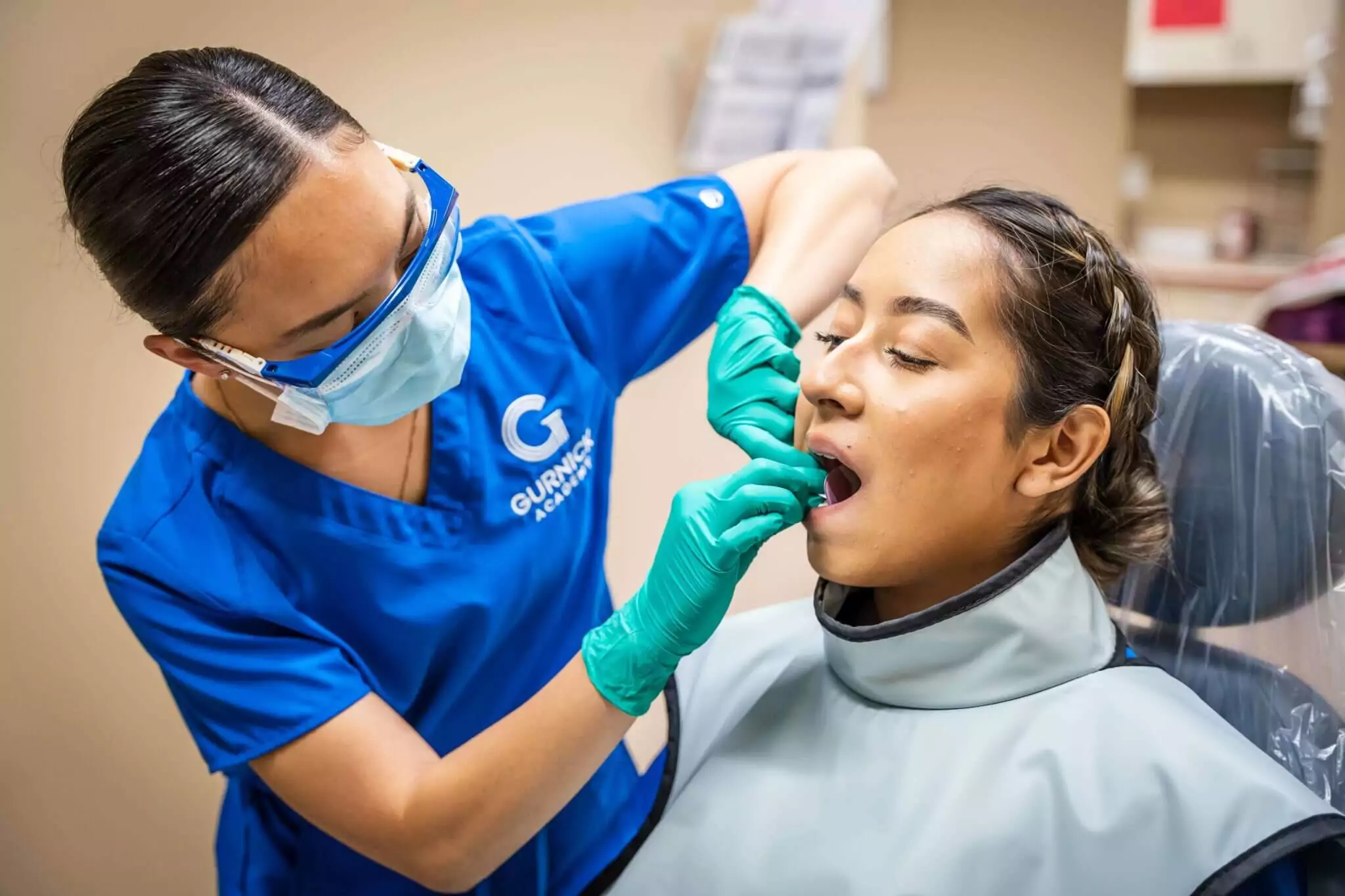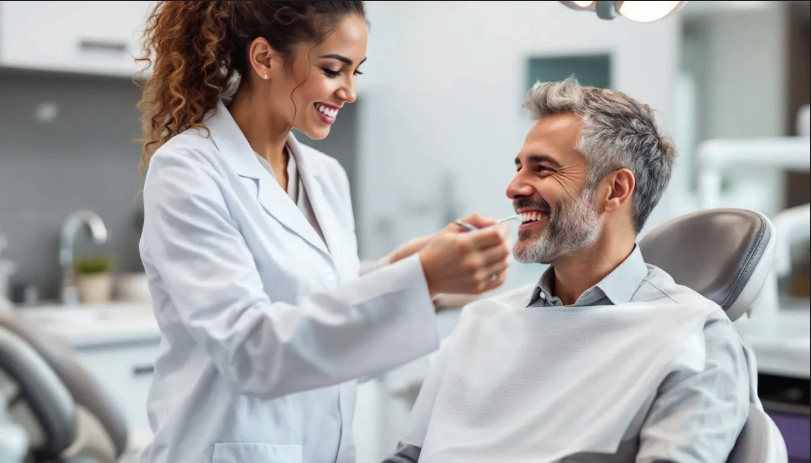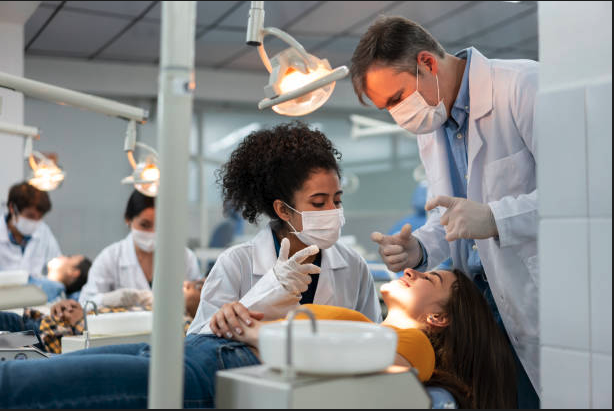Table of contents
Get Started with Kwikly
Get the latest updates, insights, and exclusive content delivered straight to your inbox.
Who This is For
- Students, career changers, and aspiring dental professionals who want a clear roadmap to becoming a dental hygienist.
- Current dental assistants considering their next step
- Anyone curious about the education, exams, and career opportunities available in this growing field.
Key Takeaways
- Dental hygienists are crucial for oral health - you’ll focus on preventive care, teaching patients, and helping with dental procedures.
- To become a dental hygienist, you need to finish an accredited program and pass national and state exams. No way around it. If you're a new hygienist graduate, consider exploring temping opportunities to jumpstart your career.
- The job outlook is strong, with labor statistics from the U.S. Bureau of Labor Statistics showing 9% growth from 2023 to 2033 and median salaries around $94,260. Not bad, depending on your experience and what you specialize in.
If you want to become a dental hygienist, you need the right education, skills, and certification. That means completing an accredited program, passing some key exams, and getting hands-on experience. We're going to break down each step for you, so you know exactly what you need to start your dental hygiene career.
Introduction to Dental Hygiene
Dental hygiene is more than just keeping teeth clean—it’s a vital part of overall health and well-being. As a dental hygienist, you’re on the front lines of oral health, helping patients prevent oral diseases and maintain good oral hygiene. Dental hygienists work in a variety of settings, from private dental offices to public health clinics, and play a key role in educating patients about the importance of oral care.
To become a dental hygienist, you’ll need to complete an accredited dental hygiene program, which provides the foundation for both clinical skills and patient care. These programs, recognized by the American Dental Association, ensure you’re prepared to meet the highest standards in dental hygiene practice. Whether you choose an associate degree or pursue a bachelor’s degree for broader opportunities, your education will cover everything from oral health assessment to the latest oral hygiene techniques.
Dental hygienists are essential members of the dental team, working closely with dentists and dental assistants to deliver comprehensive dental care. Your responsibilities go beyond cleaning teeth—you’ll assess patients’ oral health, develop preventative treatment plans, and educate patients on how to care for their teeth and gums. Many dental hygienists also participate in school health programs and community outreach, promoting good oral health on a larger scale.
The path to becoming a licensed dental hygienist includes passing the National Board Dental Hygiene Examination and a regional clinical board examination. Once licensed, you’ll need to complete continuing education hours to stay current with advances in dental medicine and maintain your credentials. The field offers strong job growth, competitive salaries, and the chance to make a real difference in people’s lives by preventing oral diseases and promoting lifelong health.

Understanding What You'll Actually Do as a Dental Hygienist
As a dental hygienist, you’re a key player on the dental team, and your main job is keeping patients’ oral health on track. Here’s what you’ll be doing:
- Cleaning teeth
- Teaching patients about oral hygiene
- Checking their oral health
You’ll help prevent problems like gingivitis and periodontal disease by catching things early and providing preventive care.
But it’s not just cleaning teeth. You’ll also help dentists during procedures and screen for potential issues. In some cases, you may assist with administering anesthesia during dental procedures that require sedation or local anesthesia. Teaching patients how to take care of their teeth is a big part of what you do - and it’s more important than most people realize. You’re combining clinical skills with patient education, which makes you vital to the whole dental care process.
What Your Day Actually Looks Like
A typical day in your life as a dental hygienist involves a bunch of different tasks, all aimed at keeping your patients' oral health in good shape. You'll be:
- Cleaning teeth
- Checking gums
- Taking X-rays
- Getting medical histories
You'll also help dentists during procedures and report anything you find or any symptoms patients mention.
You'll use all kinds of dental equipment to get this done - hand tools, power tools, and X-ray machines.
Skills You Actually Need
If you want to succeed as a dental hygienist, you need a mix of technical and people skills. You need to communicate well with patients and your team - that’s huge. Manual dexterity and attention to detail are must-haves for precise dental work. Patient management skills are also essential for handling diverse patient needs and ensuring effective care.
And here’s something people don’t always think about - empathy helps you build rapport with patients. When people feel comfortable and cared for during their visits, everything goes smoother.
Patient Interaction: Building Trust and Comfort
One of the most rewarding—and important—aspects of being a dental hygienist is building trust and comfort with your patients. Every visit to the dental office is an opportunity to make a positive impact, not just on someone’s oral health, but on their overall experience with dental care. Dental hygienists are often the first point of contact for patients, so your ability to communicate clearly and compassionately is essential.
Effective patient interaction starts with listening. Understanding each patient’s concerns, medical history, and unique needs allows you to tailor your care and advice. By explaining oral hygiene techniques in a way that’s easy to understand, you help patients feel empowered to take charge of their dental health. Whether you’re demonstrating proper brushing and flossing, recommending fluoride treatments, or discussing preventative strategies, your guidance can make a lasting difference.
Many dental hygienists find that educating patients is one of the most fulfilling parts of the job. You’re not just cleaning teeth—you’re teaching people how to prevent gum disease, recognize early signs of oral diseases, and maintain good oral health habits at home. This educational role is especially important in public health settings, where you may work with diverse populations and address broader community health needs.
Building rapport also means creating a comfortable environment, especially for patients who may feel anxious about dental visits. A gentle approach, clear explanations, and a reassuring presence can help patients relax and trust the care they’re receiving. As a licensed dental hygienist, your commitment to ongoing dental hygiene education and continuing education hours ensures you’re always up-to-date with the best ways to educate and support your patients.
By focusing on patient interaction, dental hygienists not only improve individual outcomes but also contribute to a culture of good oral health in their communities. Whether you’re working in private dental offices, schools, or public health clinics, your ability to connect with and educate patients is at the heart of what makes this career so impactful.
How to Get the Education You Need
If you want to become a dental hygienist, you need to complete an accredited dental hygienist program and earn an associate or bachelor's degree in dental hygiene. An associate's degree is the minimum requirement for licensure, typically taking about two years to complete. Many people choose to pursue a bachelor's degree, as bachelor's degree programs offer advanced opportunities, may be required for certain specializations, and can lead to higher pay and career advancement.
Picking the right dental hygienist school matters. Many associate degree programs are offered at community colleges and technical schools, providing accessible pathways to enter the profession. Look for CODA-accredited programs—dental accreditation ensures the program meets quality and industry standards. Dental hygienist schools offer both associate's and bachelor's degree programs, and degree completion programs are available for those who already have related experience or licensure. The curriculum in these programs includes dental sciences as a core subject area, along with general education and biomedical sciences. Schools like Concorde Career College and SJVC have solid programs that prepare you for licensure and a successful career. Completing a dental hygiene degree from an accredited dental hygienist program is required for licensure.
Courses You Need Before You Start
Before you can even get into a dental hygiene program, you need certain prerequisite courses like Biology, Chemistry, Microbiology, Physiology, and Mathematics. Most programs want a high school diploma, a minimum GPA of 2.75, and a grade of C or higher in these courses.
You also need strong skills in reading, writing, math, and science to succeed in the program.
Picking the Right Program
When you're choosing a dental hygiene program, think about things like accreditation, program format, and degree level. CODA accreditation means the program meets industry standards and prepares you for licensure exams.
You can choose between an associate degree (about two years) or a bachelor's degree (typically four years). Some associate degree programs also offer online completion programs if you want to continue your education later.
What You'll Actually Study
Dental hygiene programs prepare you for your career and licensure exams. You'll cover oral health, anatomy, health assessment, and patient evaluation. Most programs take about three years to complete, and the coursework is pretty rigorous - but that's what develops the skills you need.

Getting Real Experience
Hands-on experience is huge in dental hygiene education. It’s where you take everything you’ve learned and apply it in real-world settings. This practical training builds your skills and confidence - both essential for becoming a competent dental hygienist. Supervised clinical experience is a required component of most dental hygiene degree programs and is necessary for licensure.
Clinical practice is a major part of these programs:
- You’ll typically spend 8 to 12 hours per week in supervised clinical practice during your first year.
- That goes up to 12 to 16 hours per week in your second year.
- Internships and externships give you opportunities to work in real dental offices under experienced professionals’ guidance.
Clinical Training
Supervised clinical practice is where you really learn. You'll work directly with patients under instructor supervision, developing skills in teeth cleaning, patient assessment, and taking X-rays.
Clinical rotations help you gain practical experience and prepare for the regional clinical board examination - a key step in getting licensed.
Internships and Externships
Externships give you valuable hands-on experience in real dental offices. You get to apply your skills in practice and bridge the gap between what you learn in school and what you'll actually do.
When you participate in externships, you build confidence and competence, preparing you for what a dental hygienist role actually demands.
Getting Licensed and Certified
You have to get a state license to practice as a dental hygienist. No exceptions. The licensure process involves meeting specific educational and examination requirements, including completing an accredited program, passing the NBDHE, and a state clinical exam. All states require dental hygienists to obtain state licensure before practicing, and each state requires dental hygienists to pass a state-specific clinical examination to ensure high standards of patient care. Passing the national dental examinations, administered by the Joint Commission on National Dental Examinations, is a key step in becoming a licensed hygienist. Licensing makes sure dental hygienists meet national standards and can provide safe, effective care.
Continuing education is crucial for keeping your license. You need to complete specific hours during renewal periods to stay updated on advances in dental care and provide the best service. If you don’t meet these requirements, you can’t renew your license - so ongoing learning is essential.
National Board Dental Hygiene Examination
The NBDHE is a critical step in getting licensed. It tests the knowledge and skills you need for safe and effective dental hygiene practice, making sure you meet national standards.
You need to choose an accredited program that prepares you for the NBDHE - passing it is required to work as a registered dental hygienist.
State Clinical Exams
State clinical exams are another vital part of licensure. You'll perform dental hygiene procedures while being observed. These exams test your practical skills, making sure you can provide safe, effective patient care.
Each state has specific requirements, so make sure you know the regulations in the state where you plan to get licensed.
Continuing Education
You need to keep up with continuing education to maintain your license. This training helps you stay current with advances in dental care. Most states require specific hours during each renewal cycle - anywhere from 10-20 hours annually to 60 hours every three years, depending on where you are.
Meeting these requirements makes sure you stay competent and up-to-date in your field.
Career Opportunities and Moving Up
A career in dental hygiene gives you lots of opportunities for growth and advancement:
- You can pursue further education, earning bachelor’s or master’s degrees.
- A master's degree, typically completed in 1–2 years, can prepare you for advanced roles in teaching, research, administration, and public health.
- Advanced degrees can lead to roles in education, research, administration, and public health.
- The field has strong job growth.
- It’s an attractive, stable, and rewarding career option.
You can specialize in areas like:
- Pediatric dentistry
- Community health
- Oral pathology
These specializations boost your career prospects and impact in oral health. A master's degree typically takes 1–2 years and can lead to higher-level professional opportunities, such as program directors and educational researchers.

Where You Can Work
Most dental hygienists work in dental offices, but some are employed in hospitals, schools, and public health clinics.
You can work in lots of different settings:
- Dental offices
- Hospitals
- Schools
- Public health clinics
These settings give you various experiences and opportunities for professional growth. Internships and externships often involve additional responsibilities and give you a deeper understanding of how dental offices operate.
Platforms like Kwikly let you work in diverse clinical environments, which further enhances your skill set.
Specializations
You can specialize in various fields, which enhances your career and impact in oral health. Specializations include roles in:
- Education
- Research
- Administration
- Public health
- The corporate sector
Advanced degrees let you dive deeper into topics like systemic dental conditions and pediatric oral health, furthering your expertise and career prospects.
Advanced Roles
If you earn a master's degree in dental hygiene, you can move into advanced roles like education, research positions, health care administration, public health roles, and advanced clinical positions.
These opportunities offer better pay and the chance to make a real impact.
Positions like oral disease prevention specialists and community program directors are examples of high-level roles available if you get advanced degrees.
Job Outlook and What You Can Expect to Earn
The job outlook for dental hygienists looks good - demand is expected to grow significantly. The growing demand for dental services is a key factor driving employment growth for dental hygienists. Here’s what you need to know:
- More people are keeping their teeth into older age.
- The need for preventive dental care is increasing.
- There’s a projected 9 percent employment increase from 2023 to 2033.
- That translates to about 19,600 new positions.
What you can expect to earn varies based on experience, location, and type of employment. The median salary as of May 2024 was $94,260. According to dental hygienist salary data, factors such as education, years of experience, and work setting can significantly impact your earnings, and salaries may also vary by state.
Dental offices are the top industry for dental hygienists and offer a median wage of $94,570. Things like your position, education, and work setting significantly influence your annual earnings.
Employment Growth
The job outlook for dental hygienists is really bright. Employment is expected to grow by 9 percent from 2023 to 2033 - that's way higher than the average for all occupations. This growth is driven by increased emphasis on preventive dental care and rising demand as the population ages.
About 16,400 job openings for dental hygienists are expected each year, reflecting new positions and replacements for retiring professionals.
What You Can Make
Dental hygienist salaries vary a lot depending on where you are, your experience, and the type of work you do. While the median annual wage was $94,260 in May 2024, the lowest 10 percent earned less than $66,470 annually.
Entry-level positions typically offer lower salaries than roles in research, teaching, or corporate settings. There are resources available to compare salaries by state, which gives you valuable insights if you're considering different locations.
Challenges and Rewards of the Job
Becoming a dental hygienist comes with both challenges and rewards. The physical demands and managing patient anxiety can be tough, and it is also essential to adhere to medical ethics in providing patient care and maintaining professional standards. However, the profession offers a lot of benefits. Dental hygienists often have high job satisfaction because of meaningful patient interactions and the opportunity to educate people about oral health. You can learn more about the reasons dental hygienists love their careers in our detailed overview.
The role offers a comfortable salary and flexible work arrangements, making it attractive for many people. You play a vital role in promoting overall well-being through education and preventive care, which contributes to your sense of fulfillment and purpose.
Common Challenges
One challenge you'll face as a dental hygienist is the physical strain of the job. You'll spend long periods in awkward positions, which can lead to musculoskeletal issues. You need effective strategies for maintaining your physical health and well-being.
The demanding nature of the job can result in stress and burnout, so effective stress management is crucial for long-term success.
Rewards and Benefits
Despite the challenges, the rewards of being a dental hygienist are significant. High job satisfaction comes from meaningful patient interactions and the ability to positively impact people's oral health. Many dental hygienists also enjoy a comfortable work environment and the flexibility of part-time work arrangements, letting you balance personal and professional commitments effectively.
Competitive pay and the opportunity to educate patients contribute to the overall fulfillment in this career.
How Kwikly Can Help You Succeed
Kwikly is a leading dental staffing platform in the United States, designed to connect dental professionals with flexible job opportunities. Whether you're looking for full-time temping or extra income, Kwikly offers a modern platform that matches dental hygienists with reputable dental offices across the country. The platform is trusted by major dental service organizations (DSOs) like Heartland Dental and Smile Brands, so you have access to high-quality shifts.
One of the key benefits of using Kwikly is the flexibility it offers. You can choose your shifts based on your personal availability, giving you a perfect balance between work and personal life. Kwikly also offers same-day payment options through Kwikly Wallet, so you can get your earnings quickly after completing shifts.
With a user-friendly app and a 100% satisfaction guarantee on all shifts, Kwikly is dedicated to helping dental professionals succeed.
Signing Up with Kwikly
Signing up with Kwikly is straightforward:
- You can join by applying online through the Kwikly app or website.
- The onboarding checklist is designed to be completed quickly.
- You can start accessing shifts almost immediately.
Once you're registered, you can browse available shifts, set your schedule, and begin working in reputable dental offices in your area.
Benefits of Using Kwikly
Using Kwikly offers a lot of benefits for dental hygienists and dental offices—use our Savings Calculator to estimate how much your practice can save.
- Same-day payment options, so you get your earnings promptly after completing shifts
- Competitive pay
- Flexibility to choose when and where you work
Whether you're looking for full-time temping or extra income, Kwikly's modern platform works with your scheduling needs, helping you achieve a perfect work-life balance.
Summary
Becoming a dental hygienist is a rewarding career path that offers lots of opportunities for growth and advancement. From understanding the role and daily tasks to navigating educational pathways and licensing requirements, this guide has given you a comprehensive overview of what it takes to succeed in this field. With the support of platforms like Kwikly, you can find flexible, well-paying job opportunities that fit your schedule, ensuring a fulfilling and balanced professional life. Embrace the journey to becoming a dental hygienist and make a positive impact on oral health and overall well-being.
Frequently Asked Questions
What are the educational requirements to become a dental hygienist?
To become a dental hygienist, you need to complete an accredited dental hygiene program, typically at the associate degree level, which is the minimum requirement for licensure. A bachelor's degree is also an option if you're looking for advanced opportunities in the field.
What is the National Board Dental Hygiene Examination?
The National Board Dental Hygiene Examination (NBDHE) is essential for licensure - it tests the knowledge and skills you need for practicing dental hygiene safely and effectively.
How can Kwikly help dental hygienists find job opportunities?
Kwikly connects dental hygienists with flexible job opportunities, letting you choose shifts that fit your schedule while also providing same-day payments. This platform gives you control over your work-life balance.
What are the common challenges faced by dental hygienists?
You'll commonly face physical strain from prolonged awkward positions, leading to musculoskeletal issues, as well as stress and burnout from the demanding nature of the work. These challenges can significantly impact your health and job satisfaction.
What are the benefits of being a dental hygienist?
Being a dental hygienist offers high job satisfaction, competitive pay, and flexible work schedules, along with the rewarding opportunity to educate patients and improve their oral health. This role not only benefits your career but also positively impacts other people's well-being.








